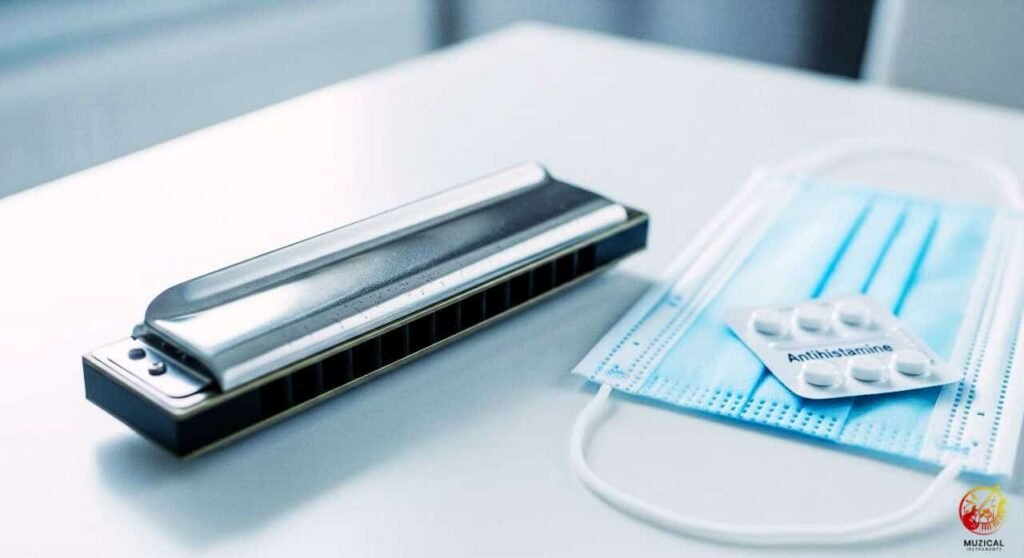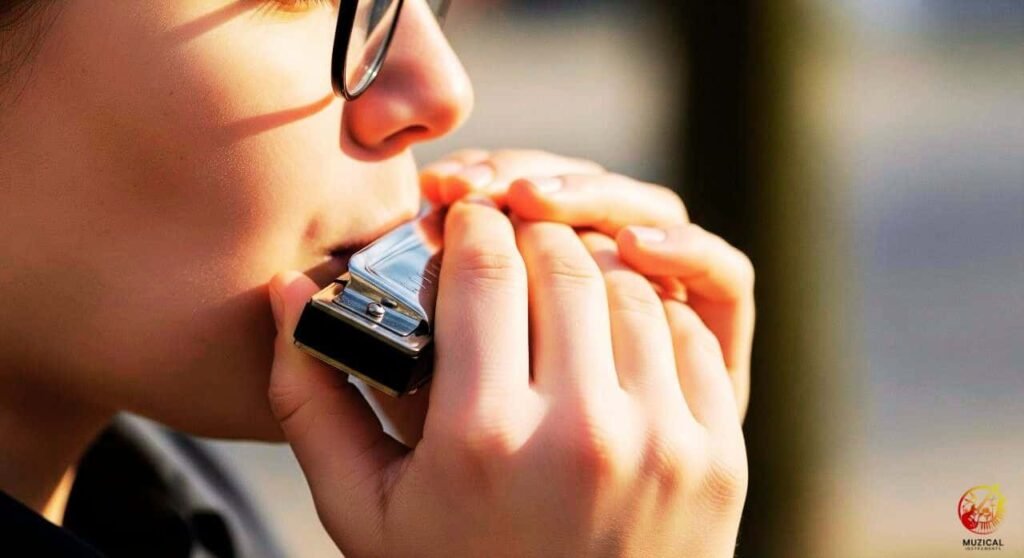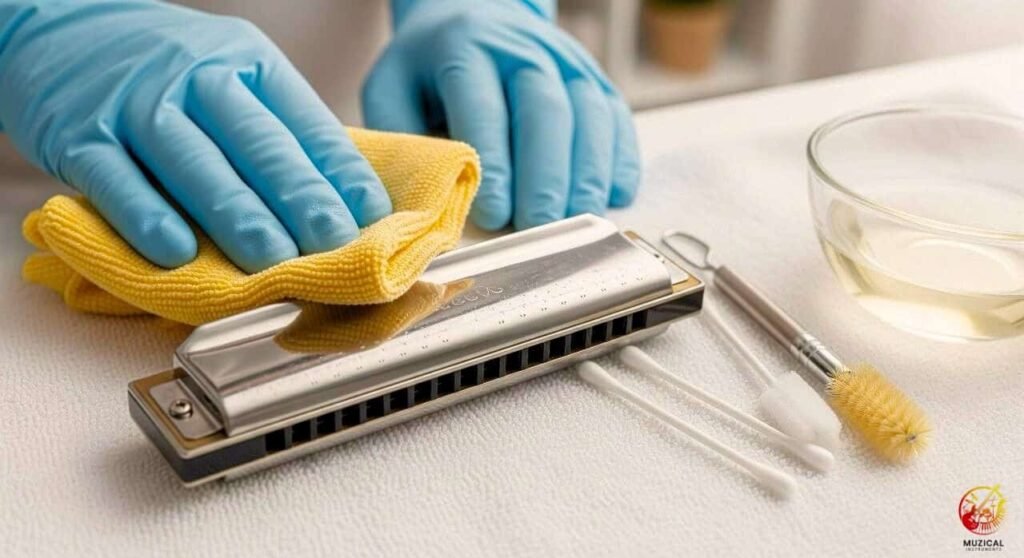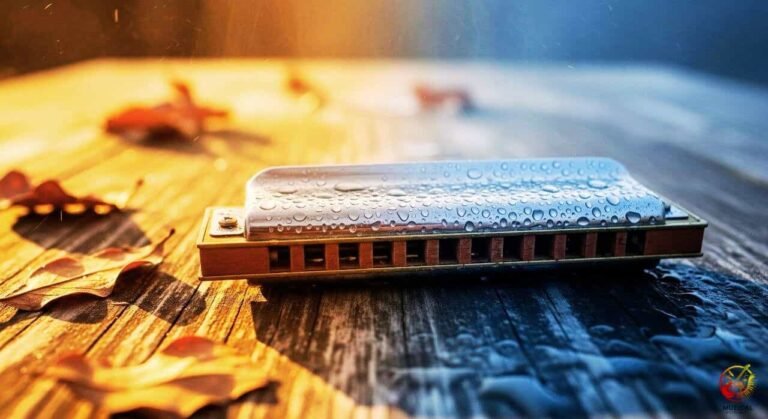Does Harmonica Cause Allergy? What Every Player Needs to Know
Does harmonica cause allergy problems? Yes, it can. Turns out, one in twenty harmonica players has some kind of allergic reaction to their instrument.
Your harmonica has more allergens than you’d think. The metal parts, the germs growing inside, even the wood or plastic, they can all cause problems. Some players get swollen lips. Others can’t breathe right. A few develop rashes that won’t go away.
But you don’t have to quit playing. Once you know what’s causing your symptoms, you can usually fix them.
Let’s look at what makes harmonicas cause allergies and how to keep playing safely.
Does Harmonica Cause Allergy Through Metal Parts?

The metal in your harmonica is often the main problem. You press metal against your lips every time you play. That brass reed plate releases tiny bits of copper and zinc. The chrome covers have nickel in them. Nickel causes more skin allergies than almost any other metal.
I know players who were fine for years, then suddenly got “harmonica dermatitis.” Your body can decide it doesn’t like nickel even if it never bothered you before. First, your lips feel tingly after playing. Then they turn red. Maybe they swell up. Soon you have cracked, painful lips that won’t heal.
The reed plates cause their own problems. Most are made of brass with 60% copper. Some people are sensitive to copper. When you breathe on the reeds, moisture makes them release more metal particles. These get absorbed through your mouth. Players who bend notes a lot put extra stress on reeds, which releases even more particles.
There’s also leftover gunk from the factory. Companies use chemicals to put the parts together. Some of these chemicals stay on the harmonica even after cleaning. You end up with industrial compounds right where your mouth touches.
Can Playing Harmonica Trigger Breathing Problems?

Breathing issues surprise a lot of players. You expect to breathe better from playing, not worse. But harmonicas can trigger asthma and other breathing problems.
Here’s why: you blow warm, wet air through tiny channels. Any dust or pollen in your harp goes straight into your lungs. If you have allergies, your harmonica becomes a machine that shoots allergens into your body. German researchers found that wind players have twice as many breathing problems as guitar players.
The reeds shed tiny metal bits that you breathe in. Your lungs can handle some particles, but breathing brass dust over and over causes “musical instrument lung.” That’s a real medical condition. Players get wheezy and short of breath. They develop a dry cough that won’t quit.
Mold is another hidden problem. Leave a wet harmonica in its case and mold starts growing in days. The types that grow in harmonicas, Aspergillus and Penicillium make breathing problems worse. You can’t see the mold, but you breathe in the spores when you play.
Does Harmonica Cause Allergy from Bacteria?
This is gross but important your harmonica is full of bacteria. Scientists checked harmonicas from music schools and found as many germs as on toilet seats.
Your mouth has over 700 types of bacteria. Most are harmless. But when they move into your harmonica, they form biofilms. These are slimy layers that protect bacteria from cleaning. The biofilms release toxins that make your immune system go crazy. It looks like an allergy, but it’s really your body fighting bacterial proteins.
Sharing harmonicas is extra risky. You’re not just sharing germs, you’re swapping entire bacterial colonies. The other person’s normal mouth bacteria might be totally foreign to your body. Music teachers who test student harmonicas get exposed to new germs constantly. Many develop chronic mouth and throat problems.
Wood combs soak up spit like sponges. The moisture feeds bacteria, yeast, and mold. Even sealed wood isn’t safe forever. The coating wears off where your mouth touches. Plastic combs resist moisture better, but they get tiny scratches that hold germs.
Which Harmonica Materials Are Safest?
Picking the right materials can solve most allergy problems. The classic Hohner Marine Band is great, but not if you’re sensitive to brass or wood.
Stainless steel harmonicas work best for metal allergies. Seydel makes harps from surgical steel with zero nickel. They cost twice as much as brass ones, but they last longer and won’t trigger reactions. The steel reeds actually sound better as they age.
| Material | Allergy Risk | Good Brands | Price |
|---|---|---|---|
| Brass/wood | High | Hohner Marine Band | $40-60 |
| Stainless steel | Very Low | Seydel 1847 | $120-200 |
| Aluminum comb | Low | Hohner Crossover | $70-100 |
| Plastic | Low | Lee Oskar | $45-65 |
Aluminum combs are a good middle choice. They don’t absorb water or grow bacteria. The coating stops direct aluminum contact, which matters since some people react to raw aluminum. Players say aluminum combs stay cleaner and don’t smell bad like wood can.
Some custom builders make titanium coated reed plates. Titanium is the same stuff used in surgical implants. It’s totally safe for your body. These cost a lot but work for super sensitive players.
How Do You Prevent Allergies From Harmonica Use?
Prevention comes down to cleanliness, material choice, and good habits.
1. Choose the Right Material:
- Opt for stainless steel or plastic combs instead of nickel-plated covers.
- Some brands advertise “nickel-free” models specifically for sensitive players.
2. Maintain Regular Cleaning:
- Rinse your harmonica with lukewarm distilled water (only if the model is designed for it).
- Use a soft brush to remove residue between reeds.
- Disinfect with alcohol wipes occasionally, but avoid overuse since it can damage wood combs.
3. Practice Good Playing Habits:
- Avoid eating or drinking sugary liquids before playing, this feeds mold growth.
- Always dry your harmonica after sessions.
- Rotate between multiple harmonicas to give each one drying time.
With these steps, you reduce both mold and metal contact risks significantly.
How Often Should You Clean Your Harmonica?

Cleaning is your best defense against allergies. Most players don’t clean enough, then wonder why they have reactions.
After every session, tap out the spit. Turn your harp upside down and tap it on your hand. This gets rid of most moisture that feeds bacteria. Let it dry for 30 minutes before putting it away. Skip this and bacteria multiply fast.
Do a deep clean every week. Take your harmonica apart if you can. Soak the plates in warm water with a little dish soap. Use a soft toothbrush on the comb slots. Some players use denture tablets, they kill mouth bacteria and dissolve that slimy biofilm. Rinse well and let everything dry before putting it back together.
| Cleaning | How Often | Time | Helps By |
|---|---|---|---|
| Tap out | Every time | 30 seconds | 40% |
| Wipe down | Daily | 2 minutes | 60% |
| Deep clean | Weekly | 15 minutes | 85% |
| Full rebuild | Every 3 months | 45 minutes | 95% |
UV sanitizers kill germs without chemicals. These devices use special light to destroy bacteria and mold. A 15-minute UV treatment kills 99.9% of germs without hurting your harmonica.
Does Harmonica Cause Allergy Symptoms That Need a Doctor?
Sometimes you need medical help despite doing everything right. Don’t ignore symptoms that keep getting worse.
See a doctor fast if your lips swell a lot, you get hives, or you can’t breathe well. These could mean a serious allergic reaction. An allergist can do patch tests to find exactly what bothers you. They tape allergen samples to your back for two days. It’s not fun, but you get real answers.
Treatment depends on your triggers. Steroid creams calm skin reactions. Antihistamines reduce overall allergies. Some players need inhalers for asthma triggered by playing. Really sensitive people might need immunotherapy, controlled exposure to allergens that trains your immune system.
Your doctor might suggest barrier products. Lip barriers with dimethicone create an invisible shield between you and the harmonica. Some players put dental wax on problem spots. These aren’t perfect, they can affect your playing but they’re better than quitting.
Final Thoughts: Play On, Pain-Free!
Does harmonica cause allergy issues? Sure, but you don’t have to stop playing. The trick is finding your triggers and fixing them. Maybe you need a steel harmonica. Maybe you just need to clean more. Most players with allergies can keep playing with some changes.
The harmonica community gets it now. Companies make more allergy friendly options than ever. Players share tips online all the time. You’re not alone with these problems.
Your health matters most. If you have symptoms, don’t ignore them. Deal with the problem directly, and you’ll probably find a way to keep playing. The real question isn’t “does harmonica cause allergy?” It’s “how can I keep playing despite my allergies?” For most players, there’s an answer.
FAQ: Does Harmonica Cause Allergy?
1. Can you be allergic to a metal harmonica?
Yes, you can. The most common issue is a nickel allergy, which causes a skin rash called contact dermatitis. Many harmonica cover plates are nickel-plated, and direct contact with your lips can trigger a reaction if you’re sensitive.
2. Why do my lips swell when I play the harmonica?
Swollen lips after playing are a classic sign of an allergic reaction to the materials in your harmonica, most likely the nickel on the cover plates. It could also be a reaction to mold or bacteria if the instrument isn’t clean, but an allergy is a very common cause.
3. What is harmonica rash?
“Harmonica rash” is the informal name for contact dermatitis caused by playing the harmonica. It typically appears as redness, itching, small blisters, and swelling on the lips and around the mouth where the skin touches the metal parts of the instrument.
4. Are Hohner harmonicas hypoallergenic?
It depends on the model. A classic Hohner Marine Band has a wood comb and nickel-plated covers, which can cause issues. However, a model like the Hohner Special 20 has a non-reactive plastic comb, making it a better choice. For a truly hypoallergenic option, you’d need to find a harmonica with stainless steel covers, which some premium brands offer.
5. How do you get rid of harmonica lip?
First, stop playing the harmonica to let your lips heal completely. You can use over-the-counter hydrocortisone cream to reduce itching and inflammation. To prevent it from returning, either switch to a hypoallergenic harmonica (made with stainless steel and plastic) or thoroughly clean your current one to rule out a reaction to germs.
6. Can a dirty harmonica make you sick?
Yes, a dirty harmonica is a breeding ground for bacteria, mold, and viruses. Playing an unclean instrument can potentially lead to oral infections, respiratory issues, or cold sores. Regular cleaning and disinfecting are essential for your health.
7. What are the best harmonicas for sensitive skin?
The best harmonicas for sensitive skin are those made with inert, hypoallergenic materials. Look for models with stainless steel cover plates and a plastic (ABS) comb. Brands like Seydel (specifically their 1847 line) are famous for using stainless steel, making them an excellent choice for players with metal allergies.




